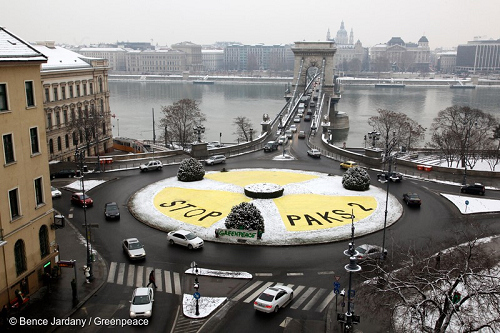Commission green light for Paks state aid ignores Orbán takeover of nuclear regulator
The European Commission has given a green light to state subsidies for the construction of the Paks II nuclear power plant in Hungary. The decision is irresponsible and ignores prime minister Viktor Orbán’s takeover of Hungary’s nuclear regulator, warned Greenpeace.

A new law approved by the Hungarian Parliament in early December allows the government to overrule the country’s nuclear regulator on matters related to the construction of nuclear reactors and radioactive waste storage facilities. Greenpeace warned that government control threatens the regulator’s independence and its ability to enforce nuclear safety measures. The independence and transparency of national regulators is a basic safeguard enshrined in the Euratom Treaty.
Greenpeace EU legal adviser Andrea Carta said: “The Commission is being spectacularly irresponsible: it’s allowing massive subsidies for a project backed by a government that openly challenges the importance of independent oversight for nuclear safety. The EU competition watchdog uses the Euratom treaty to justify state aid, but ignores the treaty when it clearly conflicts with Hungary’s takeover of its nuclear regulator. The Commission’s decision means Paks will have an unfair advantage on the energy market, making it harder for renewable energy to compete.”
Hungary wants Rosatom – a state-owned Russian company – to build two new reactors at the Paks nuclear plant. The Commission launched an infringement case after Hungary awarded the contract without holding an open tender, but Brussels approved the Rosatom deal in November 2016. The Commission has refused to explain how it reached this decision.
Russia plans to finance the reactors through an international loan, as stipulated in a 2014 nuclear cooperation agreement with Hungary. Paks II is expected to cost around €12.5 billion. The Hungarian government has repeatedly denied that the project would require state aid.
Greenpeace Hungary energy campaigner András Perger said: “With the decision, the Commission recognises that Paks can only go ahead with public subsidies. But it’s not over yet. We intend to challenge the project’s environmental license, which breaches several national and international laws. The Hungarian government has mislead its people: Paks II is not economically viable and it will cost taxpayers dearly.”
Source: Greenpeace EU Unit
- 330 reads
Human Rights
Fostering a More Humane World: The 28th Eurasian Economic Summi

Conscience, Hope, and Action: Keys to Global Peace and Sustainability

Ringing FOWPAL’s Peace Bell for the World:Nobel Peace Prize Laureates’ Visions and Actions

Protecting the World’s Cultural Diversity for a Sustainable Future

Puppet Show I International Friendship Day 2020

